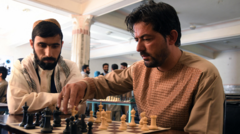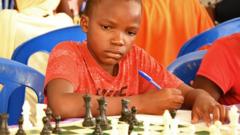In a striking move reflecting their strict interpretation of Islamic law, the Taliban government in Afghanistan has announced an indefinite ban on chess due to concerns over its association with gambling. This decision aligns with a broader pattern of restricting sports and recreational activities since the Taliban reclaimed control of the country in August 2021.
Taliban Enforces Ban on Chess Amid Concerns of Gambling

Taliban Enforces Ban on Chess Amid Concerns of Gambling
The Taliban restricts chess in Afghanistan, citing its association with gambling and requiring a review under Islamic law.
On Sunday, Taliban sports directorate spokesman Atal Mashwani stated that chess is viewed as a potential vehicle for gambling in accordance with Islamic sharia law. "Until these considerations are addressed, the sport of chess is suspended in Afghanistan," Mashwani remarked while addressing concerns surrounding the game's permissibility under religious guidelines.
This ban draws attention to the Taliban's increasing control over various aspects of life, particularly sports, which have become increasingly constrained. Women and girls face complete exclusion from participation in sporting events, further limiting opportunities within the realm of physical activity.
A cafe owner in Kabul, who hosted informal chess games, expressed disappointment over the recent ban, emphasizing that such activities had provided a vital social outlet for the youth, who are often left with few recreational options. "Young people don't have a lot of activities these days, so many came here every day," said Azizullah Gulzada, highlighting the impact on his business and the community.
The situation for sports in Afghanistan has deteriorated since the Taliban's return to power, with other activities like mixed martial arts (MMA) also banned for being deemed too violent and incompatible with sharia law. As the regime continues to impose its austere vision, the debate over cultural and recreational freedoms remains a critical concern for the Afghan populace.
This ban draws attention to the Taliban's increasing control over various aspects of life, particularly sports, which have become increasingly constrained. Women and girls face complete exclusion from participation in sporting events, further limiting opportunities within the realm of physical activity.
A cafe owner in Kabul, who hosted informal chess games, expressed disappointment over the recent ban, emphasizing that such activities had provided a vital social outlet for the youth, who are often left with few recreational options. "Young people don't have a lot of activities these days, so many came here every day," said Azizullah Gulzada, highlighting the impact on his business and the community.
The situation for sports in Afghanistan has deteriorated since the Taliban's return to power, with other activities like mixed martial arts (MMA) also banned for being deemed too violent and incompatible with sharia law. As the regime continues to impose its austere vision, the debate over cultural and recreational freedoms remains a critical concern for the Afghan populace.






















